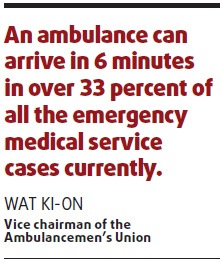Union and Security Bureau clash on ambulance dispatch rules
Updated: 2009-11-03 08:01
By Guo Jiaxue(HK Edition)
|
|||||||||
HONG KONG: The Ambulancemen's Union presented their objections to the proposal presented by the Security Bureau to introduce the Medical Priority Dispatched System (MPDS) as a replacement of the existing single pledge system. The Union believes the MPDS would not bring the expected benefit to Hong Kong. The Union suggested several minor adjustments to the current system, which will be enough to enhance the emergency ambulance service.
"The response time under the MPDS will be determined by how much information the callers can provide, which greatly depends on the callers' knowledge and communication ability," said Wat Ki-on, vice chairman of the Ambulancemen's Union.
If the caller cannot express the patient's conditions clearly, the call will be inappropriately categorized and the ambulance will arrive later than it should, he said.
Moreover, Wat is also concerned the response time under the proposed MPDS might be longer than present. "Currently it takes an average of 25 seconds to send an ambulance," he said. A set of structured questions will be asked by operators to solicit the essential information from callers, according to the MPDS. Wat queried whether that might extend the time.

Objecting to the proposed MPDS plan, the Ambulancmen's Union suggested two minor adjustments be made to the current ambulance medical service, and that the service continue to adopt the current help-seeking mode to determine the emergency level of the patients.
They suggested for the most urgent life-threatening cases, such as cardiac disease, severe hemorrhage, and unconsciousness, the response time target should be set at six minutes; for other emergency cases, they recommend that the response time target be reduced to 11 minutes from the current 12 minutes, Wat said.
Over 6 percent of the total emergency calls were life-threatening cases in 2008. An ambulance can arrive in 6 minutes in over 33 percent of all the emergency medical service cases currently, Wat indicated. He believes it could definitely meet the needs of life-threatening cases by introducing medical priority dispatching software and increasing manpower.
The MPDS has already had a 20-year history, with 34 countries having adopted the system. None of them, however, is an Asian country, according to Wat.
To enhance emergency ambulance services in the long run, the Security Bureau has proposed the new MPDS, by categorizing and prioritizing responses to emergency ambulance calls in accordance with the degree of emergency. Under the provisions of the proposal, the MPDS will categorise the emergency calls into three different types. An ambulance will arrive in nine minutes for critical or life-threatening calls, rather than the Ambulancemen's Union's recommended six minutes. Response time for serious but not-life-threatening calls will remain at 12 minutes. Response time for non-critical calls will be 20 minutes.
The scheme's four-month consultation period ends today.
(HK Edition 11/03/2009 page1)